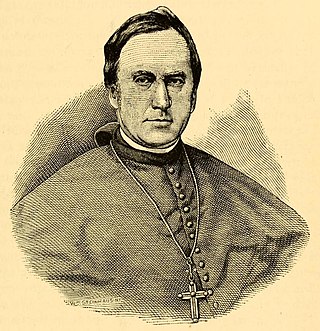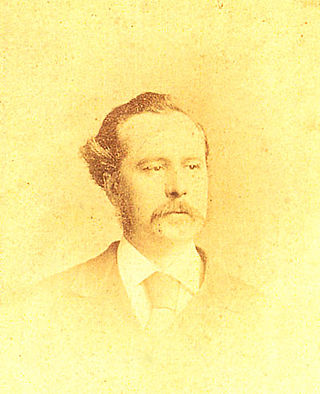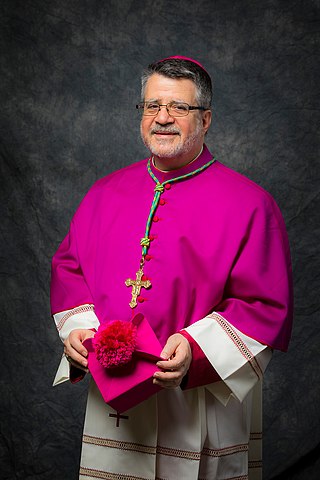
Michael O'Connor, S.J. was an Irish-born prelate of the Roman Catholic Church in the United States and a member of the Society of Jesus. He served twice as bishop of the Diocese of Pittsburgh in Pennsylvania. O'Connor served briefly as bishop of the Diocese of Erie for several months in 1853.

The Diocese of Clifton is a Latin Church diocese of the Catholic Church centred at the Cathedral Church of Saints Peter and Paul in Clifton, England.

Ratcliffe College is a coeducational Catholic private boarding and day school near the village of Ratcliffe on the Wreake, Leicestershire, approximately 7 miles (11 km) from Leicester, England. The college, situated in 100 acres (0.40 km2) of parkland on the Fosse Way about six miles (10 km) north of Leicester, was founded on the instructions of Blessed Father Antonio Rosmini-Serbati in 1845 as a seminary. In 1847, the buildings were converted for use as a boarding school for upper-class boys. The college became coeducational under the presidency of Father Tony Baxter in the mid-1970s. As of the 2018–2019 academic years, there were 850 students on roll at Ratcliffe, from ages 3 to 18.
Edmund James O'Reilly was an Irish Jesuit Catholic theologian.
George Errington (1804–1886), the second son of Thomas Errington and Katherine (Dowdall) of Clints Hall, Richmond, Yorkshire, was a Roman Catholic churchman.

Edward Welby Pugin was an English architect, the eldest son of architect Augustus Welby Northmore Pugin and Louisa Barton and part of the Pugin & Pugin family of church architects. His father was an architect and designer of Neo-Gothic architecture, and after his death in 1852 Edward took up his successful practice. At the time of his own early death in 1875, Pugin had designed and completed more than one hundred Catholic churches.
Edward Metcalfe was a British Benedictine scholar.

John Briggs was an English prelate of the Roman Catholic Church. He served as the first Bishop of Beverley from 1850 to 1860.
St Stanislaus College was a Jesuit boys boarding school, novitiate and philosophy school, in Tullabeg, Rahan, County Offaly. St Carthage founded a monastery of 800 monks there in 595 before founding his monastery in Lismore. The Presentation Sisters also have a convent in Rahan, Killina, which was founded at the same time as the Jesuits founded St Stanislaus College.

John Bede Polding, OSB was the first Roman Catholic Archbishop of Sydney, Australia.
The Rosminians, officially named the Institute of Charity, abbreviated I.C., are a Roman Catholic clerical religious congregation of Pontifical Right for men founded by Antonio Rosmini and first organised in 1828.

Aloysius Luigi Gentili was an Italian Rosminian cleric.

George Aloysius Carrell, S.J. was an American prelate of the Roman Catholic Church who served as the first bishop of the Diocese of Covington, Kentucky from 1853 until his death in 1868.

Martin Marty was a Swiss-born Benedictine missionary and bishop in the United States. His birth name was James Joseph Alois Marty.

Peter Augustine Baines (1786/87–1843) was an English Benedictine, Titular Bishop of Siga and Vicar Apostolic of the Western District of England.
Rev Canon Leonard Calderbank was a Roman Catholic priest and canon of Clifton.
Thomas Burgess was an English Roman Catholic prelate who served as the Bishop of Clifton from 1851 to 1854.

Elias RIchard Lorenzo, OSB is an American prelate of the Catholic Church who has served as an auxiliary bishop for the Archdiocese of Newark in New Jersey since 2020.
James A. Ward was an American Catholic priest and Jesuit. He taught for many years at Georgetown and at the novitiate in Frederick, Maryland, of which he twice served as rector. He then became the vice president of Georgetown and was influential in the early years of Loyola College in Maryland. From 1857 to 1860, he was the President of Saint Joseph's College. He spent his later years as socius (assistant) to the Jesuit provincial superior in New York City, and teaching.
Francis Dzierozynski was a Polish Catholic priest and Jesuit who became a prominent missionary to the United States. Born in the town of Orsha, in the Russian Empire, he entered the Society of Jesus and was ordained a priest in 1806. He taught and studied in Polotsk and Mogilev until leading students in an escape from the French invasion of Russia in 1812. He returned to Polotsk, where he taught until the expulsion of the Jesuits from the Russian Empire in 1820. Thereafter, he took up teaching in Bologna, Italy.










